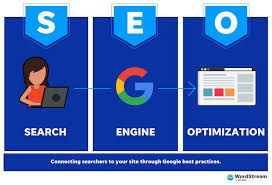The Power of Keyword Search Engine Optimization
Keyword Search Engine Optimization (SEO) is a crucial component of any successful digital marketing strategy. It involves optimizing your website content to improve its visibility in search engine results pages (SERPs) for specific keywords or phrases.
By strategically incorporating relevant keywords into your website content, meta tags, and other elements, you can increase the likelihood of your site ranking higher in search engine results. This, in turn, can drive more organic traffic to your website and improve your online visibility.
How Keyword SEO Works
Search engines like Google use complex algorithms to determine the relevance and authority of web pages for specific search queries. Keywords play a significant role in helping search engines understand the content and context of a webpage.
When users enter a search query into a search engine, the engine scans its index for web pages that are most relevant to that query based on various factors, including keyword usage. Websites that effectively optimize their content with relevant keywords have a higher chance of appearing in top search results.
Best Practices for Keyword SEO
- Keyword Research: Conduct thorough research to identify relevant keywords that align with your business and target audience.
- Keyword Placement: Strategically place keywords in page titles, headings, meta descriptions, and throughout your content.
- Quality Content: Create high-quality, engaging content that naturally incorporates keywords without compromising readability.
- User Experience: Ensure your website is user-friendly and provides valuable information to visitors.
- Monitor Performance: Regularly monitor keyword performance and make adjustments based on analytics data.
The Future of Keyword SEO
In an ever-evolving digital landscape, staying ahead of the curve is essential for effective keyword SEO. As search engines continue to refine their algorithms and user behavior evolves, adapting your SEO strategies accordingly will be key to maintaining online visibility and driving organic traffic to your website.
6 Essential Tips for Effective Keyword Search Engine Optimization
- Research relevant keywords for your content
- Use long-tail keywords for more specific targeting
- Include keywords naturally in your content
- Optimize meta tags with relevant keywords
- Regularly update and refresh your keyword strategy
- Monitor and analyze keyword performance regularly
Research relevant keywords for your content
Researching relevant keywords for your content is a fundamental step in optimizing your website for search engines. By identifying and incorporating keywords that align with your business and target audience, you increase the likelihood of your content being discovered by users searching for related information. Thorough keyword research allows you to understand the language and phrases your audience uses, enabling you to tailor your content to meet their needs effectively. This strategic approach not only improves your search engine rankings but also enhances the overall user experience on your website.
Use long-tail keywords for more specific targeting
Utilizing long-tail keywords in your keyword search engine optimization strategy can significantly enhance your targeting efforts. Long-tail keywords are more specific phrases that cater to niche audiences, allowing you to reach potential customers who are actively seeking particular products or services. By incorporating long-tail keywords into your content, you not only increase the relevance of your website to search queries but also improve the chances of attracting high-quality traffic that is more likely to convert. This focused approach to keyword optimization can lead to better visibility in search engine results and ultimately drive valuable leads to your website.
Include keywords naturally in your content
Including keywords naturally in your content is essential for effective keyword search engine optimization. By seamlessly integrating relevant keywords into your website content, you not only improve your chances of ranking higher in search engine results but also enhance the overall user experience. Avoid keyword stuffing, as it can negatively impact readability and deter users from engaging with your content. Instead, focus on creating valuable, informative content that organically incorporates keywords in a way that feels natural and flows smoothly. This approach not only boosts your SEO efforts but also helps establish credibility and authority in your industry.
Optimize meta tags with relevant keywords
Optimizing meta tags with relevant keywords is a crucial aspect of effective keyword search engine optimization. Meta tags, including meta titles and meta descriptions, provide search engines with essential information about your webpage’s content. By incorporating relevant keywords into these meta tags, you can improve the chances of your website appearing in search engine results for those specific terms. This not only enhances the visibility of your website but also helps attract targeted organic traffic that is more likely to convert. Remember to choose keywords wisely and ensure they align with the content on the respective webpage for optimal results in search engine rankings.
Regularly update and refresh your keyword strategy
Regularly updating and refreshing your keyword strategy is essential for maintaining a strong online presence through search engine optimization. As search trends and user behavior evolve, staying current with relevant keywords ensures that your website remains visible to your target audience. By continuously refining and adapting your keyword strategy, you can improve your search engine rankings, attract more organic traffic, and stay ahead of the competition in the digital landscape.
Monitor and analyze keyword performance regularly
Monitoring and analyzing keyword performance regularly is a crucial aspect of effective keyword search engine optimization. By tracking how specific keywords are performing in search engine results, businesses can gain valuable insights into the effectiveness of their SEO strategies. This data allows them to identify trends, measure the impact of their efforts, and make informed decisions on optimizing their content for better visibility and higher rankings. Consistent monitoring and analysis enable businesses to stay agile in a dynamic digital landscape, ensuring that they remain competitive and relevant in the ever-evolving world of online search.

